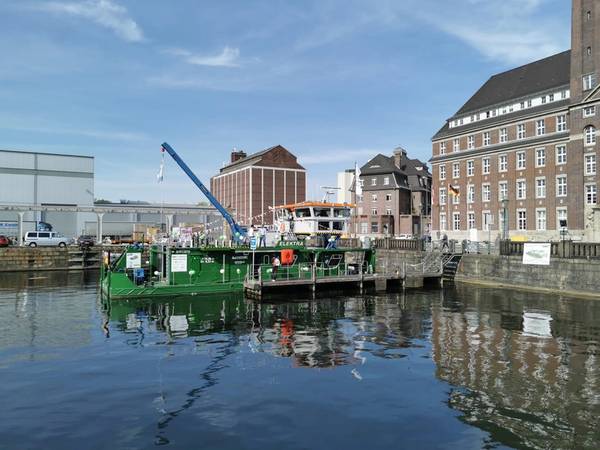
A first-of-its-kind emissions-free push boat has been christened and delivered in Germany.
The unique and innovative vessel, Elektra, was built over the course of nearly 2.5 years at Hermann Barthel GmbH in Derben and features battery-electric propulsion system combined with hydrogen and fuel cell technology, reportedly the world's first for a push boat. It will now undergo long-term prior to commencing commercial operations.
The basis of the newly developed hybrid system is the battery package, consisting of 242 DNV- approved GO1050 modules with a total capacity of 2.5 MWh, delivered by EST-Floattech, as well as three maritime fuel cell systems (NT-PEMFC, 100 kW peak power each). Although the power of the battery and the fuel cells will be used together to power the electric motors, for complete redundancy the two powertrains are entirely independent systems.
The 20-meter-long pusher with a beam of 8.2 meters and a draft of 1.25 meters will deliver an electric power capacity of 21,200 kWh for a round trip from Berlin to Hamburg.
Franziska Giffey, the Mayor of Berlin and the vessel's godmother, said, "The world's first zero-emission push boat is the impressive result of the cooperation between stakeholders from the shipbuilding, energy and propulsion technology industries. . . This lighthouse project shows us how we can succeed, by implementing innovative ideas, in improving the climate on our access waterways for the long-term."
Elektra is the product of a partnership between eight dedicated firms. Under the project management of the Dept. of Maritime Systems Design and Operations at the Technical University of Berlin, BEHALA - Berliner Hafen- und Lagerhausgesellschaft - (logistics), shipyard Hermann Barthel, BALLARD Power Systems (fuel cells), Argo-Anleg (hydrogen system), SER Schiffselektronik Rostock (electrical energy system), EST-Floattech (battery system) and HGK Shipping (nautical operation) are involved in the development, construction and testing of the push boat.
The. €14.6 million project is backed by the Federal Ministry for Digital and Transport (BMDV) with approximately €9.1 million and supported and coordinated by project manager Jülich (PTJ) and the National Organization for Hydrogen and Fuel Cell Technology (NOW).
The groundbreaking vessel will serve as a role model because its power system is designed to be applicable to a variety of barge and coastal vessel types, Federal Minister Dr. Volker Wissing said during the delivery ceremony. “The entire project is a blueprint for the climate and environmentally friendly inland shipping, not only technically but also in terms of regulation real pioneering work,” he said.
The vessel's environmentally friendly power system will not only about providing energy for the ship's propulsion and pushing convoys, but also about the energy for the crew, who live, cook and wash on board. The system provides energy for the temperature control of the cabins and the wheelhouse. The battery system also needs a certain ‘comfortable temperature’ for efficient operation and a long lifespan. All of this must be done with a limited amount of carried energy and without loss of operational range.
The waste heat from the fuel cells is used through continuous water cooling and the cabins are heated by a brine heat pump. An additional advantage is that the ship always operates in water with temperatures above 0°C under its keel.
The use of a self-developed energy management system and a digital sailing assistant support the captain and logistics planner with the planning of operations and transports.
With 750 kilograms of gaseous hydrogen (at a pressure of 500 bar) on board and a battery capacity of approximately 2,500 kilowatt hours, the ship has a range of approximately 400 kilometers when sailing in combination with the loaded heavy lift barge Ursus.
Therefore, next to the Westhafen in Berlin, only one additional land-based station is needed to supply the Elektra with hydrogen and electricity to sail on the waterways of Berlin in the direction of the Rhine/Ruhr, Hamburg and Stettin. In total the vessel can operate push-barge combinations up to 150 meters in length.
The first stations for the changeover of hydrogen tanks and 500 kilowatt electric charging stations will be operational in Berlin's Westhafen as well as in the port of Lüneburg in 2023.
The TU Berlin has contracted Mittelelbe Business Park and H2 Green Power & Logistics for filling and transporting the tank systems (Multiple Energy Gas Container - MEGC) with green hydrogen until the end of the Elektra project at the end of 2024.
The MEGC can be exchanged with the onboard crane and the power connection runs via a loading beam that guide the cables to land. This way the handling of the arm-thick cables is very easy for the ship's crew, the vessel is connected to the charging station in a short time and the quayside is free of cables.
Testing will initially take place in the capital region; as of 2023 the tests will also be continued on long-distance routes towards Hamburg.




